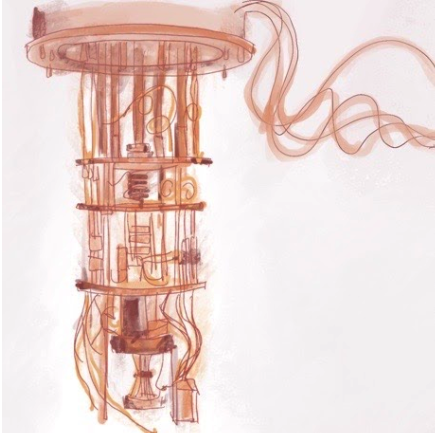Quantum Computing
The laws of quantum physics provide the basis for a different model for computation than the one conventional computers are based on.
In the past years, Moore’s law has come to an end. Researchers have therefore taken on the challenge of developing new computing paradigms, including quantum computing. The physics of conventional computers is well described by Newton’s axioms. Quantum computers, by contrast, rely on a more fundamental physical theory — quantum mechanics. Quantum mechanics enables new phenomena, such as systems that can not only be in a state zero or one, but also in a superposition of the two. Such phenomena allow to perform certain calculations very efficiently. For example, the factoring of a large number into prime factors can be done efficiently with quantum computers using Shor’s algorithm, whereas the known classical algorithms for this task are not as efficient.

An important task to run a computation on a quantum computer is to decompose it into a sequence of simple-to-perform operations that can be easily implemented on a physical architecture. This tasks corresponds to the compilation process on classical computers. Our group has developed, in collaboration with the University of York, an open-source software package, UniversalQCompiler [1], which allows to compile an arbitrary quantum computation into a sequence of simple-to-perform operations. The decomposition schemes [2] are essentially optimal [3], meaning that they minimize the experimental cost required for the implementation of the computation.
Another practically relevant task is that of optimizing a given sequence of simple-to-perform operations. In collaboration with IBM Research Zurich, we developed an efficient (classical) algorithm [3] that takes as an input a sequence of simple-to-perform operations and outputs an optimized sequence with lower implementation cost, but still performing the same overall computation.
We also collaborate with IBM Research Zurich to explore possible applications for near-term quantum computers, such as the ones provided by the external page IBM Q Experience. Amongst other studies, we investigate the use of quantum machine learning algorithms for state preparation [4], as well as the exploitation of established mathematical algorithms to enable quantum algorithms.
References
- Raban Iten, Oliver Reardon-Smith, Luca Mondada, Ethan Redmond, Ravjot Singh Kohli and Roger Colbeck. Introduction to UniversalQCompiler. external page arxiv:1904.01072
- Raban Iten, Roger Colbeck, Ivan Kukuljan, Jonathan Home and Matthias Christandl. Quantum circuits for isometries. Phys. Rev. A 93, 032318 (2016). external page doi: 10.1103/PhysRevA.93.032318 external page arxiv:1501.06911
- Raban Iten, Romain Moyard, Tony Metger, David Sutter and Stefan Woerner. Exact and practical pattern matching for quantum circuit optimization. external page arxiv:1909.05270
- Christa Zoufal, Aurélien Lucchi and Stefan Woerner. Quantum generative adversarial networks for learning and loading random distributions. npj Quantum Inf. 5, 103 (2019). external page doi: 10.1038/s41534-019-0223-2
Further reading
- Raban Iten, Roger Colbeck and Matthias Christandl. Quantum circuits for quantum channels. Phys. Rev. A 95, 052316 (2017). external page doi:10.1103/PhysRevA.95.052316 external page arxiv:1609.08103
- Raban Iten and Roger Colbeck. Smooth manifold structure for extreme channels. J. Math. Phys. 59, 012202 (2018), external page doi: 10.1063/1.5019837 external page arxiv:1610.02513